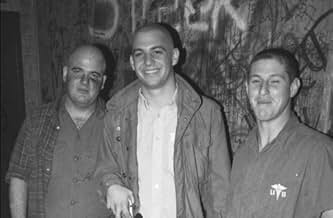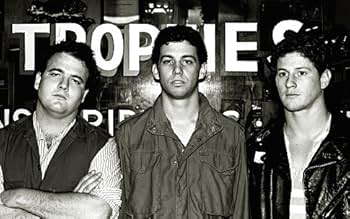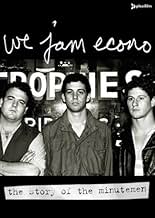ÉVALUATION IMDb
7,7/10
1,1 k
MA NOTE
Ajouter une intrigue dans votre langueA feature-length documentary chronicling early 80's punk rock band the Minutemen, from their beginnings in San Pedro, California, to their demise after the death of singer D. Boon in 1985.A feature-length documentary chronicling early 80's punk rock band the Minutemen, from their beginnings in San Pedro, California, to their demise after the death of singer D. Boon in 1985.A feature-length documentary chronicling early 80's punk rock band the Minutemen, from their beginnings in San Pedro, California, to their demise after the death of singer D. Boon in 1985.
Photos
Milo Aukerman
- Self
- (as Milo Auckerman)
Histoire
Le saviez-vous
- ConnexionsReferenced in We Stay Econo (2019)
Commentaire en vedette
It's difficult to know what to say about this well-made, honest, and truly documentary film.
On the one hand, as a fan of the band I'm grateful to have such a nice retelling of their story, crisply paced, and full of details I'd never heard.
On the other hand, I found myself at the end of it rather sad and swimming in nostalgia, and there's something so creepily unpunkrock about that, I'm not sure the basic message of keep-on-moving, do-it-yourself came out in the end.
I suspect that's a distinction between the perspective of the filmmakers, who came upon their subject matter after D. Boon's death and the split-up of the group, versus my own perspective, as a contemporary fan of the group (the number of familiar faces appearing on screen was astonishing.) As such, I also suspect the reaction of the viewer will be quite different depending on whether you were there or whether this is increasingly ancient history.
Here's what stands out:
-- this is an extremely honest and true-to-the-spirit-of-the-group film in its DVD release format (the one most of us will see, given the lack of major theatrical distribution). The filmmakers have crammed two disks with tons of extras: the documentary film itself and another 20 or so outtakes that didn't really fit into the narrative structure, but virtually all of which are amusing or edifying by themselves; three music videos the band and its friends put together, each with their own amusing moments ("This Ain't No Picnic" had me laughing aloud); an unedited interview with the band from 1984; and on disc 2, three more or less complete performances by the band, one from 1980 that shows the band at its coalescent moment and fresh on the scene, one from a college gig in 1984 that shows the band at it mature and bouncy best, and a sort of Minutemen-unplugged all-acoustic set performed for a cable access channel late in the band's existence. It's a great bargain for fans, and while I'd point newcomers to the still-in-print recordings first, this is a fantastic way of completing the band's catalog.
As a standalone documentary, it certainly tells the story well enough in a conventional narrative that it stands as history.
-- the band's uniqueness among punk bands stands out with the distance of time, and at the heart of what the Minutemen were is this strangely undying question of what it meant (or means) to be 'punk'. The band challenged authority constantly in the sense they had no training but what they provided to themselves, didn't care about popular notions of success, and had a sound that defied even the conventions of punk: jazzy, funky, explosive, melodic and abrupt all at the same time. But it's important to note, as the film makes evident, the Minutemen defied most of the emerging genre conventions of stereotyped punk. They didn't look like "punks", they didn't sound like the Ramones, they had an awareness of the world around them that went beyond the self-indulgent bemoaning of the here and now. Just when you were up and thrashing this song was over. The Minutemen stood out because they were constructive; nihilists neither in spirit nor deed.
-- what I did find frustrating about the film, though, was it never quite closed on the question of how the Minutemen truly got from playing "Smoke on the Water" to penning "Double Nickels on a Dime". We get a sort of catalog answer, in that D. and Mike Watt grew up together and were very simpatico, but is that all there is to the story? There are hints everywhere, but ultimately the interviewees seemed a bit too close to the band to add enough perspective on this question. Of course, this is often the big mystery in music, from Jimi Hendrix to Mozart, where does that extra touch of genius come from? It may be unfair of me to expect an answer in 'We Jam Econo'.
-- Context or lack thereof: the film is a bit of a hagiography - there's not a lot of discussion about the band's warts or occasional lack of selectivity in its recorded output, and the negativisms of the scene are dealt with somewhat obliquely (mainly focussing on the gobbing second-wave punk wannabes and thrashers). It's probably that there just wasn't enough time to come out with a fast-paced informative film and deal with more of the complexities of context that shaped the band. It's one thing to note three relatively untutored guys in a working class / military town railing against the creative and political repression of Reagan's America, but with twenty years between the film and the demise of the band, we might be able to start explaining to future generations just what it was like to live under the cloud of nuclear annihilation while living on government cheese. As such, this ended up playing more like a fan's document than broader history. Nothing wrong with that, mind you; it's just there's another movie to be made sometime.
-- I also wish there had been a little more attention paid in a way to George Hurley's role in the band. He co-wrote a lot of the songs, and while due credit is given to his incredibly technical, creative drumming, there's little about George's background relative to the details about the relationship between D. and Mike. The drummer makes the band.
I do warmly and highly recommend this movie to anybody with an interest not just in the Minutemen per se but pop music history in general. They were paradoxically sui generis while epitomizing the way bands lived, worked, and died back in the day. This is a primary document in that sense.
On the one hand, as a fan of the band I'm grateful to have such a nice retelling of their story, crisply paced, and full of details I'd never heard.
On the other hand, I found myself at the end of it rather sad and swimming in nostalgia, and there's something so creepily unpunkrock about that, I'm not sure the basic message of keep-on-moving, do-it-yourself came out in the end.
I suspect that's a distinction between the perspective of the filmmakers, who came upon their subject matter after D. Boon's death and the split-up of the group, versus my own perspective, as a contemporary fan of the group (the number of familiar faces appearing on screen was astonishing.) As such, I also suspect the reaction of the viewer will be quite different depending on whether you were there or whether this is increasingly ancient history.
Here's what stands out:
-- this is an extremely honest and true-to-the-spirit-of-the-group film in its DVD release format (the one most of us will see, given the lack of major theatrical distribution). The filmmakers have crammed two disks with tons of extras: the documentary film itself and another 20 or so outtakes that didn't really fit into the narrative structure, but virtually all of which are amusing or edifying by themselves; three music videos the band and its friends put together, each with their own amusing moments ("This Ain't No Picnic" had me laughing aloud); an unedited interview with the band from 1984; and on disc 2, three more or less complete performances by the band, one from 1980 that shows the band at its coalescent moment and fresh on the scene, one from a college gig in 1984 that shows the band at it mature and bouncy best, and a sort of Minutemen-unplugged all-acoustic set performed for a cable access channel late in the band's existence. It's a great bargain for fans, and while I'd point newcomers to the still-in-print recordings first, this is a fantastic way of completing the band's catalog.
As a standalone documentary, it certainly tells the story well enough in a conventional narrative that it stands as history.
-- the band's uniqueness among punk bands stands out with the distance of time, and at the heart of what the Minutemen were is this strangely undying question of what it meant (or means) to be 'punk'. The band challenged authority constantly in the sense they had no training but what they provided to themselves, didn't care about popular notions of success, and had a sound that defied even the conventions of punk: jazzy, funky, explosive, melodic and abrupt all at the same time. But it's important to note, as the film makes evident, the Minutemen defied most of the emerging genre conventions of stereotyped punk. They didn't look like "punks", they didn't sound like the Ramones, they had an awareness of the world around them that went beyond the self-indulgent bemoaning of the here and now. Just when you were up and thrashing this song was over. The Minutemen stood out because they were constructive; nihilists neither in spirit nor deed.
-- what I did find frustrating about the film, though, was it never quite closed on the question of how the Minutemen truly got from playing "Smoke on the Water" to penning "Double Nickels on a Dime". We get a sort of catalog answer, in that D. and Mike Watt grew up together and were very simpatico, but is that all there is to the story? There are hints everywhere, but ultimately the interviewees seemed a bit too close to the band to add enough perspective on this question. Of course, this is often the big mystery in music, from Jimi Hendrix to Mozart, where does that extra touch of genius come from? It may be unfair of me to expect an answer in 'We Jam Econo'.
-- Context or lack thereof: the film is a bit of a hagiography - there's not a lot of discussion about the band's warts or occasional lack of selectivity in its recorded output, and the negativisms of the scene are dealt with somewhat obliquely (mainly focussing on the gobbing second-wave punk wannabes and thrashers). It's probably that there just wasn't enough time to come out with a fast-paced informative film and deal with more of the complexities of context that shaped the band. It's one thing to note three relatively untutored guys in a working class / military town railing against the creative and political repression of Reagan's America, but with twenty years between the film and the demise of the band, we might be able to start explaining to future generations just what it was like to live under the cloud of nuclear annihilation while living on government cheese. As such, this ended up playing more like a fan's document than broader history. Nothing wrong with that, mind you; it's just there's another movie to be made sometime.
-- I also wish there had been a little more attention paid in a way to George Hurley's role in the band. He co-wrote a lot of the songs, and while due credit is given to his incredibly technical, creative drumming, there's little about George's background relative to the details about the relationship between D. and Mike. The drummer makes the band.
I do warmly and highly recommend this movie to anybody with an interest not just in the Minutemen per se but pop music history in general. They were paradoxically sui generis while epitomizing the way bands lived, worked, and died back in the day. This is a primary document in that sense.
- wall17
- 14 oct. 2006
- Lien permanent
Meilleurs choix
Connectez-vous pour évaluer et surveiller les recommandations personnalisées
Détails
- Date de sortie
- Pays d’origine
- Site officiel
- Langue
- Aussi connu sous le nom de
- ミニットメン:ウィ・ジャム・エコノ
- Lieux de tournage
- sociétés de production
- Consultez plus de crédits d'entreprise sur IMDbPro
- Durée1 heure 31 minutes
- Couleur
Contribuer à cette page
Suggérer une modification ou ajouter du contenu manquant

Lacune principale
By what name was We Jam Econo: The Story of the Minutemen (2005) officially released in Canada in English?
Répondre















